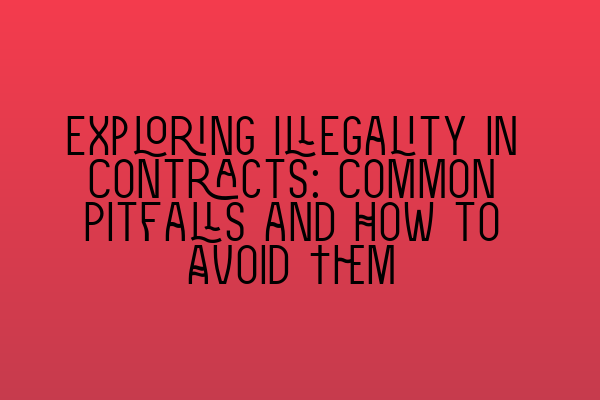Exploring Illegality in Contracts: Common Pitfalls and How to Avoid Them
Contracts are the foundation of business transactions and legal agreements, providing a framework that governs the rights and obligations of the parties involved. However, even the most meticulously crafted contracts can contain elements of illegality that can render them unenforceable or subject to legal consequences.
In this blog post, we will explore the concept of illegality in contracts, discuss common pitfalls to watch out for, and provide tips on how to avoid them. Whether you are a solicitor, business owner, or simply interested in contract law, this article will provide valuable insights and guidance.
Understanding Illegality in Contracts
Illegality in contracts refers to situations where the terms or purpose of a contract contravene the law or public policy. Such contracts are considered void or unenforceable, and the parties involved may face legal consequences.
There are various forms of illegality that can invalidate a contract:
- 1. Illegal Purpose: A contract that involves illegal activities or promotes unlawful actions is inherently void. For example, contracts related to drug trafficking or other criminal activities fall into this category.
- 2. Statutory Illegality: Some contracts may be rendered unenforceable due to specific legislation. These laws may prohibit certain types of agreements, require specific formalities, or restrict unfair contractual terms.
- 3. Public Policy: Contracts that violate public policy objectives, such as contracts that promote discrimination, harm the environment, or infringe on individual rights, can also be considered void.
- 4. Restraint of Trade: Contracts that unreasonably restrict trade or competition may be deemed unenforceable. Non-compete agreements with excessive restrictions are examples of contractual restraints that can be problematic.
It is crucial for solicitors and individuals involved in contract negotiations to be aware of these forms of illegality to avoid potential legal issues.
Common Pitfalls in Contracts
Now that we understand the various forms of illegality, let’s explore some common pitfalls that can arise in contracts:
- Lack of Legal Advice: Failing to seek legal advice when drafting or reviewing a contract leaves you susceptible to overlooking potential illegalities.
- Unclear or Ambiguous Terms: Vague or ambiguous contract terms can create uncertainty and potentially lead to situations where the contract becomes unenforceable or open to interpretation.
- Non-compliance with Formalities: Some contracts require specific formalities, such as written agreements or witnessing. Failing to comply with these requirements can render the contract unenforceable.
- Missing Essential Clauses: Omitting essential clauses, such as termination or dispute resolution provisions, can create legal vulnerabilities and make the contract incomplete.
- Illegal Activities: Engaging in or promoting illegal activities through a contract will render it void.
- Overly Restrictive Non-compete Agreements: Non-compete agreements must be reasonable in scope and duration to be enforceable. Imposing excessive restrictions on an individual’s ability to work may render the entire agreement unenforceable.
To ensure a contract is legally valid and enforceable, it is essential to avoid these common pitfalls.
How to Avoid Illegality in Contracts
Here are some practical tips to help you navigate the potential pitfalls and avoid illegality in contracts:
- Seek Legal Advice: Consult with a qualified solicitor who specializes in contract law to ensure your contracts comply with all legal requirements.
- Be Clear and Precise: Draft contracts using clear language and define terms explicitly to avoid ambiguity and misinterpretation.
- Follow Formalities: Research and understand the specific formalities required for the type of contract you are drafting to ensure compliance.
- Include Essential Clauses: Ensure all necessary clauses, such as termination, dispute resolution, and governing law, are included in the contract to protect both parties.
- Stay Informed: Keep up-to-date with legislative changes and court decisions that may impact the enforceability of contracts in your jurisdiction.
By following these steps, you can mitigate the risks of illegality in contracts and strengthen the enforceability of your agreements.
Conclusion
Understanding illegality in contracts is crucial for anyone involved in contract negotiation or drafting. By being aware of the common pitfalls and implementing best practices to ensure compliance, you can minimize legal risks and safeguard your business interests.
For more information on navigating legal challenges and pitfalls in your practice, check out our related article on Navigating Legal Challenges and Pitfalls in Your Practice. Additionally, if you want to learn about ethical responsibilities of solicitors and upholding professionalism, read our article on Ethical Responsibilities of Solicitors: Upholding Professionalism.
For a comprehensive comparison between barristers and solicitors, visit our article on Barrister vs. Solicitor: A Comprehensive Comparison. If you are interested in understanding the SRA competence statement and its significance for solicitors, our article on Understanding the SRA Competence Statement: A Guide for Solicitors can provide valuable insights.
Lastly, if you are looking to build a strong professional network as a solicitor, our article on Networking for Solicitors: Strategies for Building a Strong Network offers practical tips and strategies.
